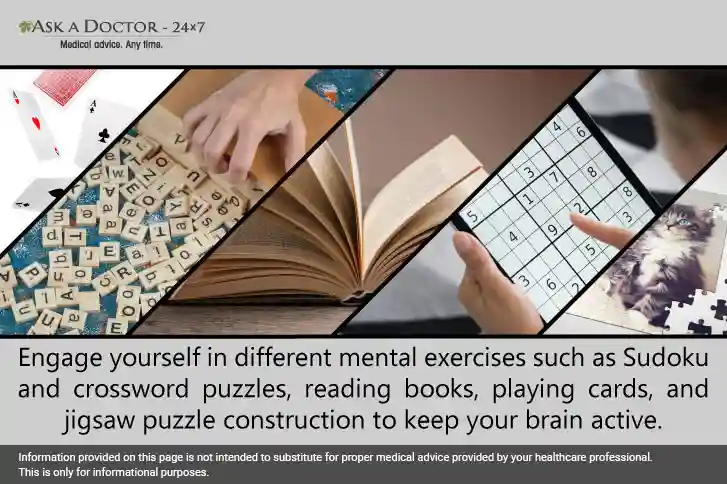6 Steps You Can Take To Protect Your Brain
Everyone occasionally has periods of forgetfulness like being unable to find home keys or forgetting your grocery list, especially when life becomes hectic. Even while this may be quite natural, having trouble remembering things might be annoying. Also, it can become distressing if you or the people around are affected by your forgetfulness. Memory is one of the many things your brain controls and you can do a lot to protect your brain health. Let’s learn how to protect your brain from memory loss or cognitive decline.
6 Steps You Can Take To Protect Your Brain

Here are some science-backed tips for incorporating into your everyday routine to improve memory function and brain health:
1) Limit refined carbohydrates and added sugar
Consumption of refined carbs, such as those found in cakes, cereal, cookies, white rice, and white bread, in large amounts may harm your memory. Due to the high glycemic index of these meals, the body digests the carbs fast, raising blood sugar levels. A spike in blood sugar levels for a prolonged time can cause bad effects on your brain causing dementia, mental deterioration, and diminished brain activity.
What to eat to boost brain health?
Try including oily fish, berries, nuts, plant-based oils, and leafy green veggies such as kale, spinach, collards, and broccoli in your daily diet. These are rich in brain-healthy nutrients like vitamin K and contain other essential nutrients that may support short and long-term brain function.
2) Be physically active
Any action that gets your body moving is called physical exercise. Do you know that physical activity not only protects you from an array of chronic illnesses like hypertension, insomnia, obesity, and diabetes but also activates beneficial genes in the brain? Physical activity increases blood supply to the brain which helps to keep your memory sharp.
It is recommended that in a week individual should do at least 150 minutes of moderate-intensity physical activity like brisk walking, swimming, dancing, etc., and 2 days of muscle-strengthening activity or 75 minutes a week of vigorous aerobic activity, such as running or jogging, and 2 days of muscle-strengthening activity.
What if you have no time for exercise?
If you don’t have time for a complete workout, even a 10-minute walk throughout the day could help.
3) Take a fish oil supplement
About, 50-60% of our brain weight comprises of fats, of which 35% consists of omega-3 polyunsaturated fatty acids (PUFAs). Fish oil contains omega-3 polyunsaturated fatty acids and has a great impact on the cognitive and memory performance of the brain. Omega-3 supports brain function, preserves neurons, and guards against neurodegeneration.
Why you should include fish oil supplements?
The essential fats in fish oil work on improving overall health like reducing heart risk, reducing inflammation, relieving stress and anxiety, improving memory, and slowing mental decline.
4) Get enough sleep
Inadequate sleep for a long time has been linked to adverse effects on your memory leading to memory loss. Memory consolidation, the process through which short-term memories are reinforced and turned into long-lasting memories, is significantly influenced by sleep.
Why consistent sleep is important?
For optimal physical and mental well-being, it is recommended to get 7-9 hours of sleep each night. If you snore and it disrupts your sleep then make sure to consult your healthcare provider to get advice on it. Snoring may indicate a sleep condition like sleep apnea so never delay meeting a health expert.
5) Limit alcohol intake
Too much alcohol in one’s blood can lead to confusion and memory loss and is detrimental to their overall health. Heavy alcohol has neurotoxic effects that are damaging to the brain. This might involve having trouble remembering recent experiences or even a whole night.
Occasional moderate drinking is not a problem but binge drinking can disrupt your hippocampal function, an important part of your brain that is connected to memory causing alcohol-induced blackouts.
How much alcohol intake do studies recommend?
Several studies claim that drinking seven units or more of alcohol per week might be enough to increase brain iron levels to a point that could lead to cognitive decline.
So it's better to drink in moderation by limiting intake to 2 drinks or less in a day for men and 1 drink or less in a day for women, as suggested in the latest American Dietary Guidelines.
6) Meditate regularly for mental health
Your health may benefit from meditation in a variety of ways. Meditation is not only calming and soothing for the body but has also shown to lower blood pressure, lessen stress and tension, increase concentration, learn new things as well and enhance memory.
How does meditation help the brain to function better?
Meditation boosts the brain's grey matter density which contains the cell bodies of brain neurons. Hence, it improves your short-term and long-term memory, reduces stress and depression, and improves your mood.
When to get a memory loss checkup?

Anyone who faces trouble remembering recent events and mostly are in below mentioned state must consult a specialist for thorough examination:
- State of regular confusion and making frequent incorrect judgments and decisions.
- Asks the same questions recurrently.
- Misplaces day-to-day items more often.
- Face difficulty in paying monthly expenses.
- Lose track of the day, the hour, or the season.
- Have trouble conversing, forgetting, or mixing words up.
- Get lost in well-acquainted places.
It is a well-proven fact that a strong memory depends on the health and vitality of your brain. Changes to your body and brain are normal as you get older, however, there are a few things you can do to slow down memory decline and improve your brain plasticity. Follow the suggested tips such as increasing your physical activity, eating mindfully, drinking alcohol in moderation, and avoiding smoking.
Remember, it's crucial to get assistance from your doctor if memory loss interferes with your ability to carry out everyday tasks, your memory is deteriorating, or if a friend or family member expresses worry about your memory loss.
If you have any questions about your forgetfulness, decrease in cognition, or related symptoms, you can check with our doctors at Ask a doctor, 24x7.
Recently Answered Questions Related to Memory Loss and Mental Health
- Suggest Treatment For Hot Flashes, Mood Swings, And Short Term Memory Loss.
- Suggest Medication For Drowsiness, Memory Loss, And Loss Of Appetite
- What Causes Cognitive Decline And Hair Loss While On Rivotril And Levipil?
- How Fast Can Dementia Progress When Diagnosed With Mild Cognitive Impairment?
- Is Discontinuation Of Gabapentin Advisable Owing To Adverse Effects?
- What Causes Memory Loss, Intermittent Blackouts, And Lack Of Concentration While On Clonazepam?
- Suggest Treatment For Memory Loss.
- What do cerebrallume Loss and Chronic Micro Vascular Changes In MRI Indicate?
- Does A Hysterectomy Lead To Cognitive Decline In Women?
- Suggest Treatment For Tiredness, Walking Difficulties, And Cognitive Decline While Having Hydrocephalus.
- Suggest Treatment For Cognitive Decline After Taking Adrafinil To Treat Post-stroke Fatigue.
Ask a Specialist
Recent Questions


